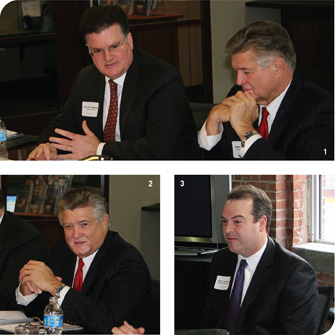
1: Jim Betterman noted the key role that third parties play in succession planning, particularly with organizations that supply credit to businesses involved. | 2. Gary Boomer noted that succession planning starts at the top, but family members have to buy in before the planning team goes to work. | 3. Matt Melton stressed the need for trusted advisers; if they're in place, he said, the work of succession planning is more likely to be done correctly.
Betterman noted that a salient part of the succession planning for businesses was sustaining a strong relationship with key third parties. It is critical, he advised, to renegotiate existing credit agreements so cash flows can continue without worry of default.
Advisory Team
The question was raised as to which professional—attorney, accountant, financial advisor—is likely to take the lead in managing a succession plan.
“It depends on whom the client has the best relationship with,” said Jerry Clark. In his experience, the client often has the closest relationship with his investment rep, but that rep typically does not give tax or legal advice. This necessitates a team approach.
“The key is that the team comes together,” said Clark, “and works for the common good and that is what is in the best interests of the customer.”
As to who manages that team, David Weaver observed that sometimes it is the client himself. More likely, however, it is the professional with whom the client feels most comfortable.
Management of a plan “depends on who controlled the relationship up front,” said Gary Boomer. To motivate his clients, Boomer reminds them that “great leaders develop their successors.” He encourages them to start developing a succession plan after age 50. This plan should detail four or five objectives and be simple and straightforward enough to fit on a single page. “The first person they have to sell is themselves,” said Boomer.
Once the client satisfies himself, Boomer continued, he has to sell his spouse and his family. Only then does he turn to the estate planning attorney, the transaction attorney, the banker, the insurance person.
Weaver suggested only half in jest that there was one professional missing from the table and the team—the psychologist. “There are emotional issues and they are challenging,” said Weaver.
Myron Sildon talked of cases where a business coach was brought in to talk to family members about how to get along in the planning process and how to share the wealth equitably with the other members of the family.
“The key here is the team approach,” affirmed Matt Melton. “The client can decide who the point person is, but if all the trusted advisors are working on the client’s behalf, you know [the plan] is going to get done.”
Julie Welch recommended regular advisor meetings to establish who the point person would be and what each member of the team would be responsible for. At these meetings, said Welch, “You pinpoint who is going to do what.” The participants also need to establish deadlines. “If you just have a plan, and you don’t put the plan into place, it doesn’t do any good.”
Again from the client’s perspective, Bob Hodgdon observed that the point person on the team—whoever he or she may be—“has the needle and keeps the thing moving.” People who are busy making money typically don’t like to sit down and talk about estate planning. “You’ve got to keep reminding them and keep going after them,” said Hodgdon to the assembled advisors. “It’s one of the best roles you can play.”
Dave Weaver agreed that business owners need prodding. “I am always amazed how people just avoid the absolute practical situation of what happens to their business if they are hit by a bus tomorrow,” he said. “I’ve talked with people with multimillion dollar businesses, and they say, ‘ah, uh, oh, I don’t know.’”
Charity
As Mike Esser observed, Republican Roy Blunt and Democrat Harold Ford had teamed up in Congress to create a charitable deduction through a traditional IRA.
David Weaver noted that now an individual could donate straight from an IRA to charity, and that donations will count towards one’s RMD—required minimum distribution. “It’s actually a better deal than to get taxed on [the donated money] and turn around and have it deducted,” Weaver added.